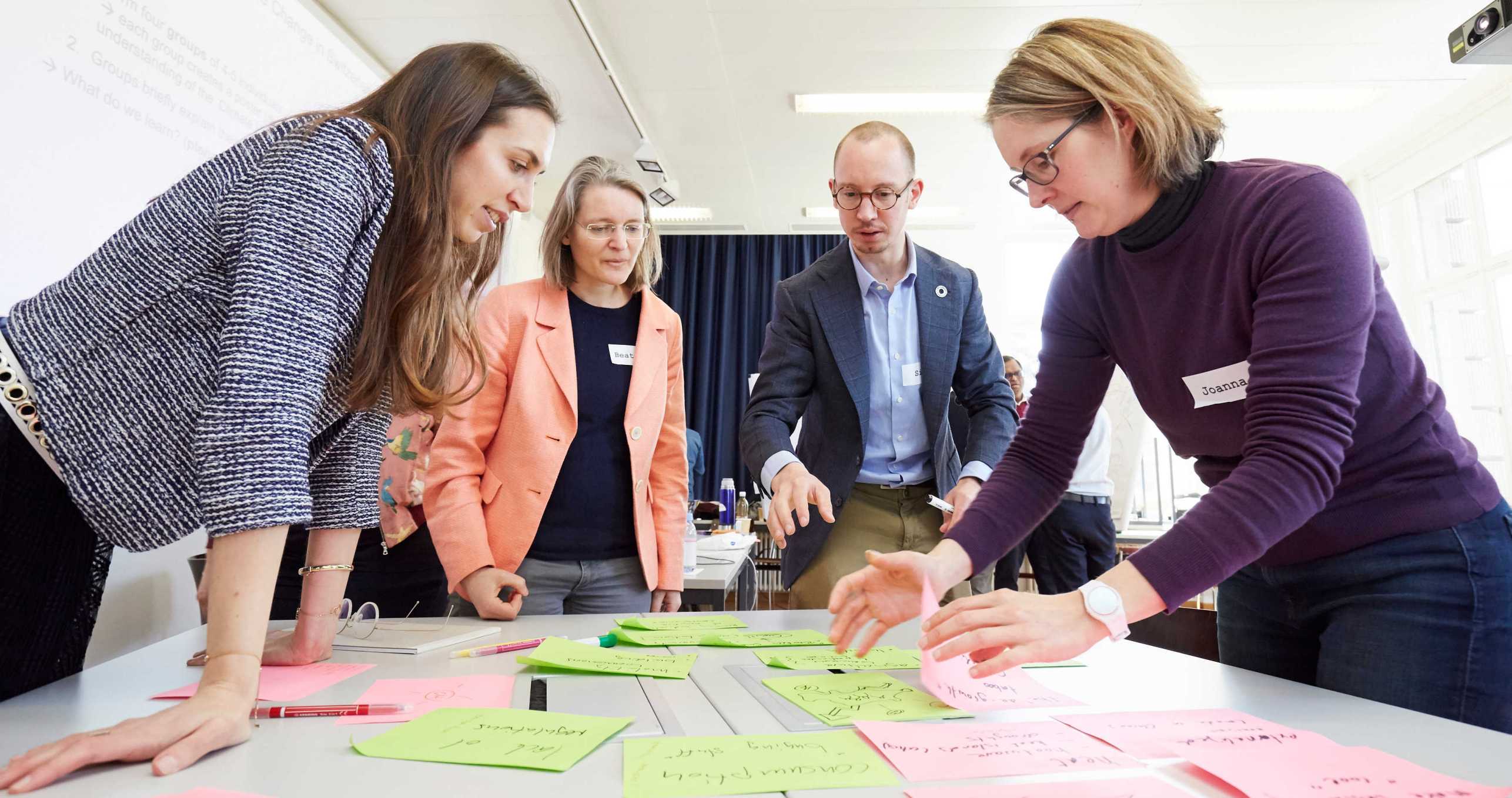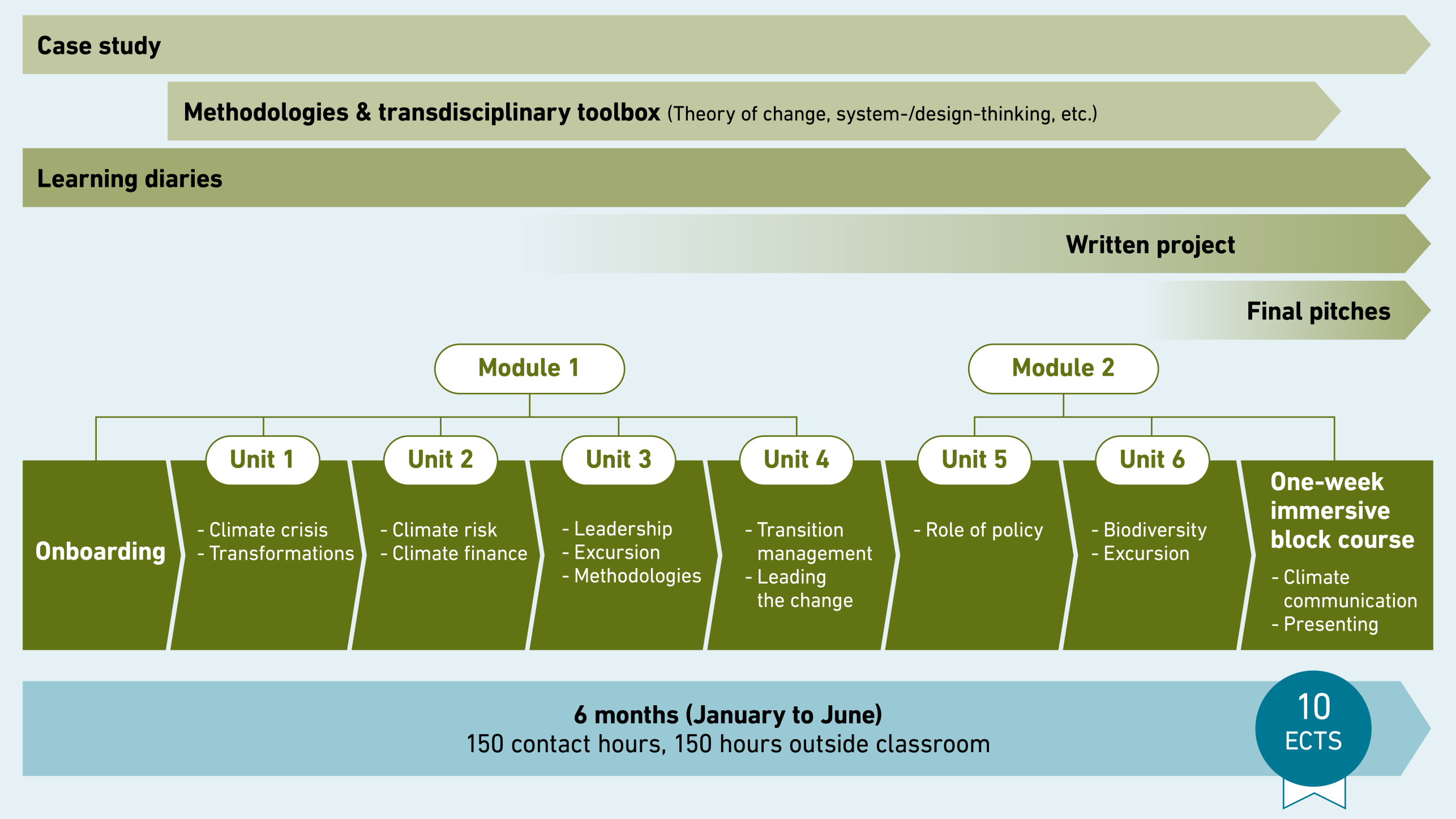CAS ETH in Climate Innovation
Working with real-world case studies, the Climate Innovation programme empowers climate change leaders with the necessary skills and knowledge to support and lead the transition towards net zero emissions in their own context.
News

The third edition of the CAS ETH in Climate Innovation came to a close with the final event. The evening was dedicated to the CAS participants and the discussion of their projects, ideas and visions.
Read the full story: Link
Mitigation of and adaptation to climate change requires deeply transformative changes of all systems and overall society towards net zero emissions.
The goal of the Climate Innovation programme is to equip climate leaders with the adequate skills and knowledge to:
- lead this transition
- navigate uncertainty and complexity
- develop impactful solutions in interdisciplinary teams.
See the participant's profile for further information.

“The programme offers cutting-edge content, driven by the latest research and leading experts from academia and industry: You will learn the kind of stuff you can’t just get from reading a book.”Miro Mayer, Head Startup Incubation at Bluelion Incubator and participant 2024

Learning objectives
This “science into practice” programme is based on:
- system knowledge
- transformational learning experience
- network activation
with an emphasis on dialogue and exchange.
CAS participants will work collaboratively on real-world case studies that are relevant to their work as well as to stakeholders.
By the end of this programme, participants will be able to
- develop high quality, critical, impactful solution in interdisciplinary teams
- communicate successfully about change making activities, climate change challenges and related solutions to any audience
- practice self-reflections as well as their role as climate leaders in the transition towards net zero emissions.
To achieve these learning outcomes, the participants will engage in peer-learning (including CAS Alumni) and utilize a network consisting of collaborators from business, government and non-governmental sectors to identify and prototype impactful solutions in interdisciplinary teams.

“If you seek a strong foundation in climate knowledge alongside personal growth, innovation techniques, and a valuable network, search no more. The instructors' dedication and the diverse, motivated peers were invaluable. We still learn from each other today.”Martina Bühler, Head Marketing at Scandens and participant 2023
Professional perspectives
Graduates will belong to the generation of climate leaders who are taking ownership in supporting the climate transition towards net zero emissions. With the acquired knowledge and skills, they will be prepared to tackle systemic wicked problems such as climate change. Enhance your career perspectives in the sustainability area.
Programme overview
The CAS is a five-month intensive programme. It consists of an introductory online programme (1 day), a mixture of six two-day modules and a final one-week immersive block course. The participants will be assessed on the learning diaries, the written project developed in a team, as well as the pitches at a final event. They will be equipped with the foundations of science, as well as different tools and methodologies to develop impactful solutions in interdisciplinary teams.

The 10 ECTS = 300 h are divided as follows:
- 150 h of contact during the modules
- 150 h outside the modules, which are expected to be used for the preparation of the modules, but mainly for the collaborative work to develop a case study within the team.
You find more information on the course modules here: Link

“The diverse teams with participants from various industries enabled me to gain and share different perspectives on how to enable our organizations and clients to accelerate the path to net zero.”Pascal Niehaus, Senior Consultant at EY-Parthenon and participant 2023
Why you should join

The Head of the programme, Dr Carole B. Rapo, gave an interview about how to promote a networking of like-minded people so that they can initiate and lead transformative changes in their professional environment.
Read the full interview with the School for Continuing Education here: Link to the interview
Further information
Each participant is responsible to arrange their accomodation and transport for the stay in Zurich.
Please consult the Housing Office of ETH Zurich for suggestions.
The application period for the 2026 programme is still closed.
The next opportunity to apply for the Climate Innovation programme is scheduled for autumn 2025. Applications will be processed for admission on a rolling basis. Please refer to the School for Continuing Education's application information for further details.
Additional application documents
- Curriculum vitae (CV)
- Motivation letter (max. one page)
An interview with the head of the programme (Carole B. Rapo) is necessary for admission. See contact below.
Entry in the ETH Course Catalogue (2025): 743-0001-00L
Programme fee
- CHF 11,000
Application fee
- CHF 50 for persons with a Swiss university degree, CHF 150 for persons with another university degree (non-refundable, credit card payment only)
Withdrawal fee
- Deregistration within 30 days after the admission date provided in ETH correspondence: Free of charge
- Deregistration more than 30 days after the admission date and before the start of the programme: CHF 2,500
- Deregistration after the start of the programme: CHF 11,000
Contact
Universitätstrasse 16
CHN E 26.1
8092
Zurich
Switzerland